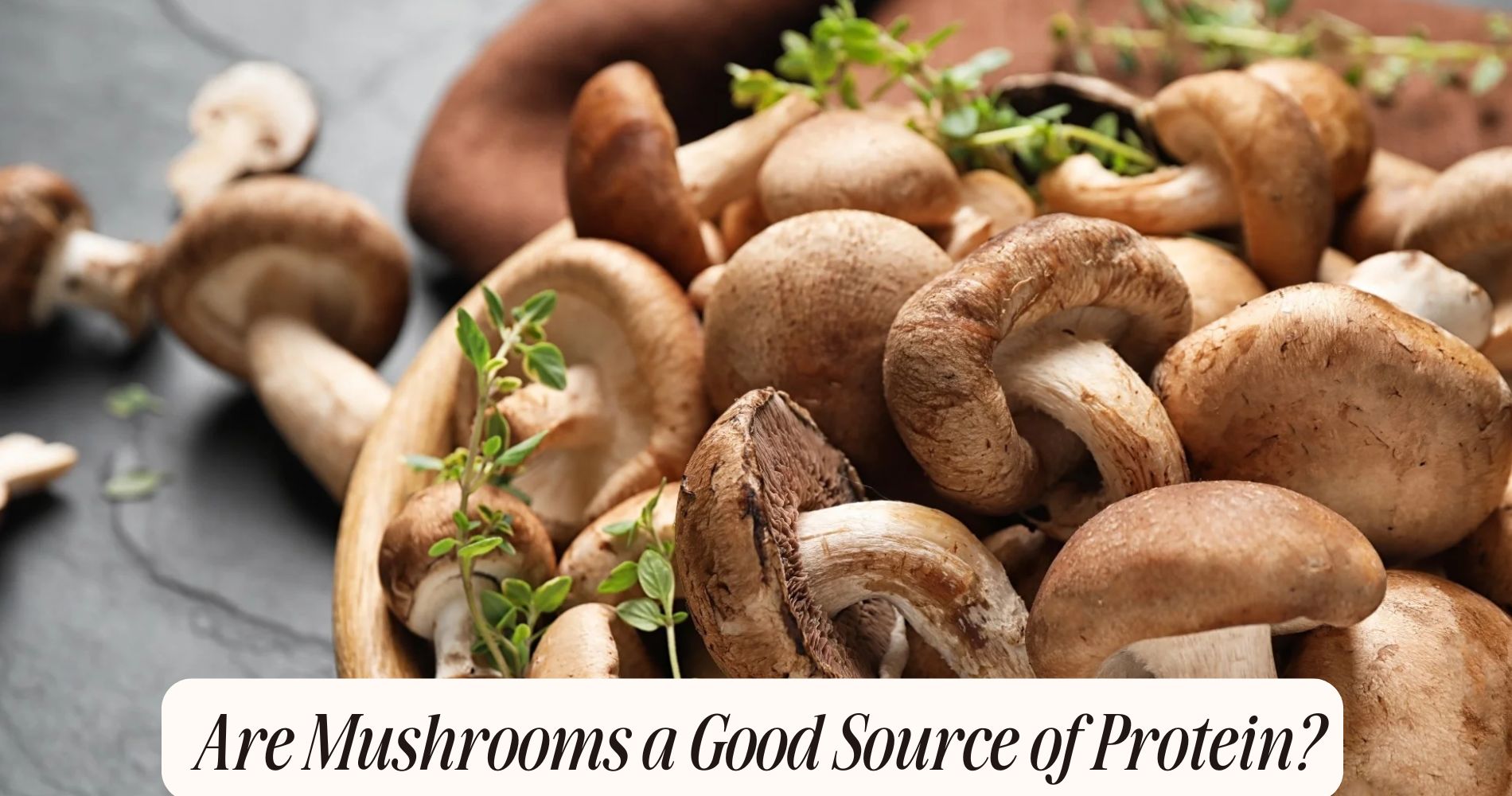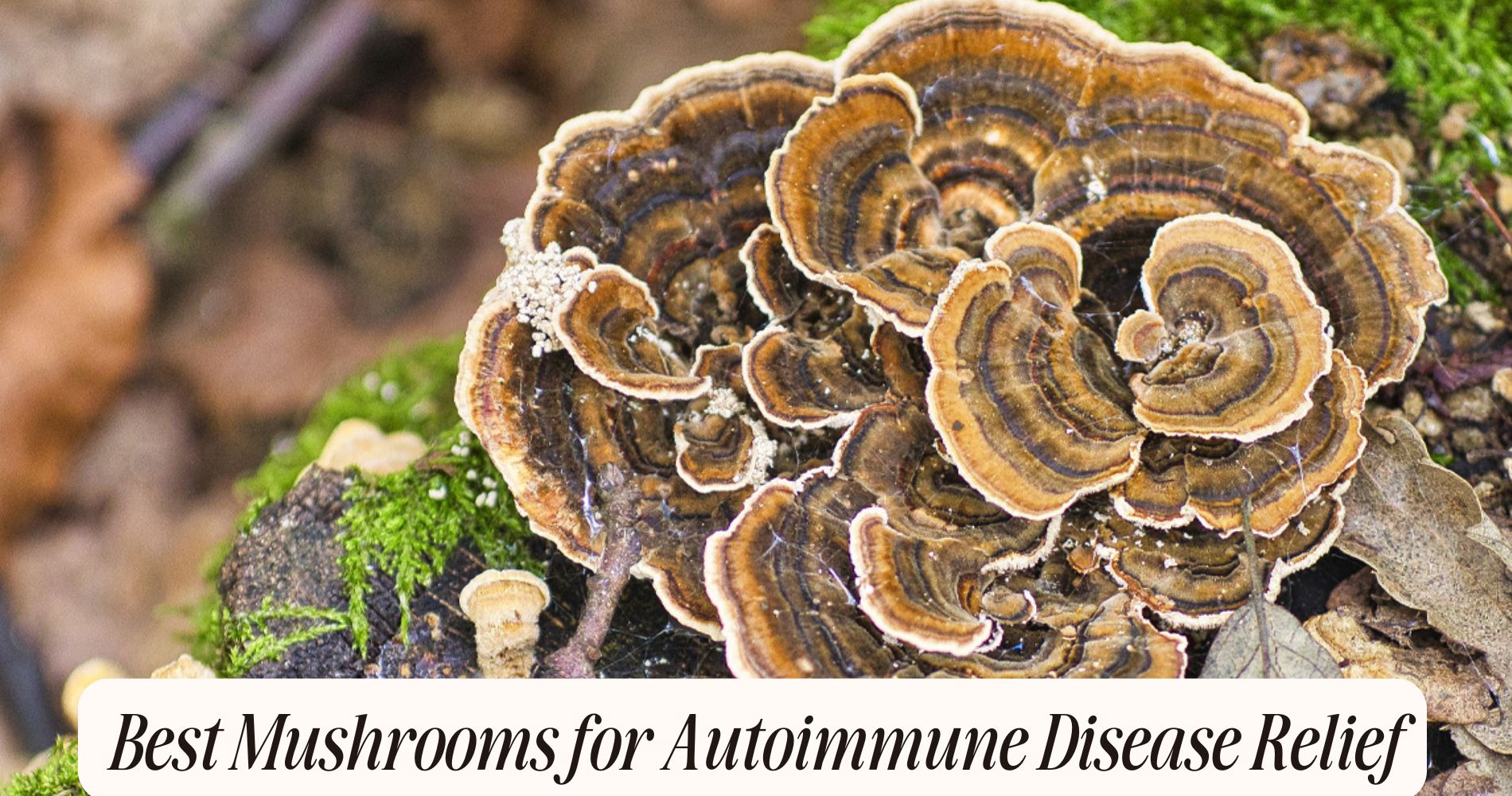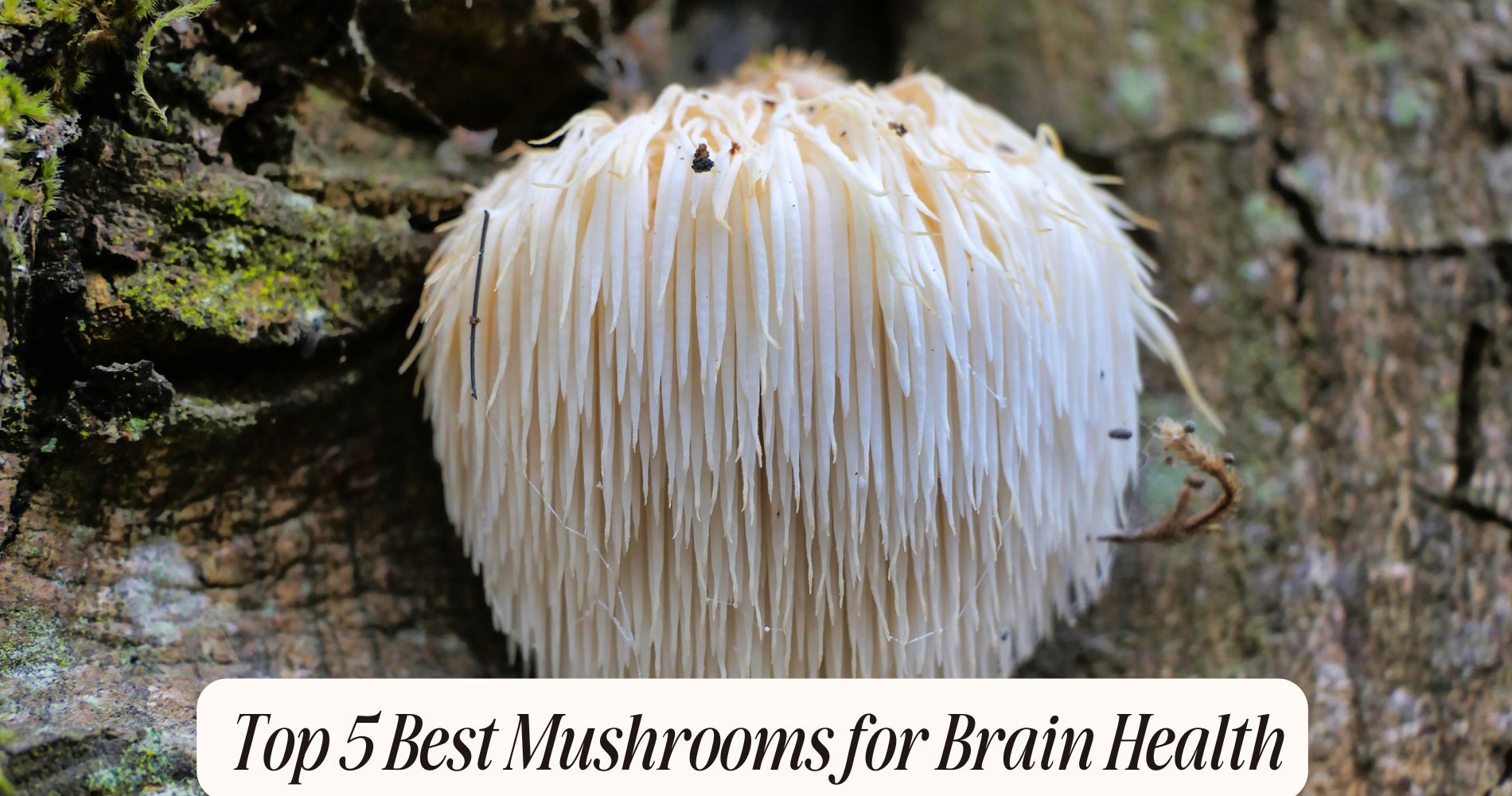
Are Mushrooms a Good Source of Protein?
Are mushrooms a good source of protein? Mushrooms can be a good source of protein, though their content is modest compared to meat or legumes. Depending on the type, like portobello or oyster mushrooms, you'll find about 2 to 3.3 grams of protein per 100 grams. They also offer essential amino acids, making them a useful addition to vegetarian and vegan diets. While they won't provide all your protein needs on their own, they complement higher-protein foods well. Plus, their low-calorie, high-fiber profile adds health benefits. For more insights on maximizing the nutritional value of mushrooms, check out what else they offer!
Nutritional Profile of Mushrooms
Mushrooms pack a powerful nutritional punch, making them an excellent addition to your diet. With a wide range of mushroom varieties available, you'll find options that not only enhance your meals but also boost your nutrient intake. These fungi are low in calories yet high in essential vitamins and minerals. For instance, many varieties, like shiitake and maitake, are rich in B vitamins, which play a vital role in energy metabolism.

Furthermore, mushrooms provide essential minerals such as selenium, copper, and potassium, contributing to overall health. Their high nutrient density means you can reap significant benefits from a relatively small serving size.
In addition, certain mushroom varieties, like portobello and cremini, are good sources of antioxidants, which help protect your body from oxidative stress.
What's more, mushrooms contain dietary fiber, promoting digestive health and helping to keep you full longer. Incorporating a variety of mushrooms into your meals can diversify your nutrient intake and enhance flavor.
Protein Content in Common Varieties
When you look at the protein content in common mushroom varieties, you'll find significant differences that can impact your dietary choices.
Understanding the nutritional profiles of these mushrooms helps you compare their protein levels effectively.
Additionally, cooking methods can alter their protein availability, making it essential to take into account how you prepare them.
Nutritional Profile Overview
While many people mightn't think of mushrooms as a protein source, these fungi actually pack a surprising nutritional punch. Different mushroom varieties contain varying amounts of protein, making them a valuable addition to your diet. For instance, shiitake mushrooms offer around 2.2 grams of protein per 100 grams, while portobello mushrooms provide about 2.5 grams.
Even more impressive, oyster mushrooms can deliver up to 3.3 grams of protein in the same serving size.
Beyond protein content, mushrooms also contain essential amino acids that contribute to overall protein absorption in your body. They're low in calories and fat, making them an ideal choice for those looking to maintain a healthy weight without sacrificing nutrition.
Additionally, mushrooms are rich in vitamins and minerals, including B vitamins, selenium, and potassium, which support various bodily functions.
Incorporating a variety of mushrooms into your meals not only enhances flavor but also boosts your nutrient intake. So, the next time you're planning your meals, consider adding more mushroom varieties to reap their protein benefits and improve your overall health.
Comparing Different Varieties
Understanding the protein content in various mushroom varieties can help you make informed dietary choices. Different types of mushrooms offer varying amounts of protein, making it essential to evaluate a protein comparison when selecting them for your meals.

For instance, shiitake mushrooms contain about 2.2 grams of protein per 100 grams, providing a decent protein boost while also delivering rich flavors. On the other hand, portobello mushrooms offer slightly less, with around 2.5 grams per 100 grams.
If you're looking for a higher protein option, contemplate oyster mushrooms, which can provide up to 3.3 grams per 100 grams. Another notable option is the white button mushroom, which contains about 3.1 grams of protein per 100 grams.
While these protein amounts may seem modest compared to meat or legumes, incorporating a variety of mushrooms into your diet can enhance your overall protein intake, along with offering other nutritional benefits.
Cooking Methods Impact
Cooking methods can markedly affect the protein content in common mushroom varieties, influencing both nutritional value and flavor.
For instance, grilling techniques can enhance the umami flavor of mushrooms while retaining much of their protein content. Sautéing effects can also preserve proteins, although high heat may lead to some loss.
Steaming benefits include minimal nutrient loss, making it an excellent option for those looking to maximize protein retention. Conversely, boiling impacts can leach nutrients into the water, reducing overall protein levels.
Roasting methods are effective for intensifying flavors while maintaining a decent protein profile.
Baking advantages come from slow cooking, allowing mushrooms to maintain moisture and nutrients.
Frying outcomes often result in a crunchy texture but can lead to a higher fat content, which might overshadow the protein benefits.
Comparison With Other Protein Sources
Mushrooms offer a unique protein source that stands out when compared to traditional options like meat, dairy, and legumes. While mushrooms contain less protein per serving than meat, they provide a sustainable alternative.
Mushroom sustainability is significant; they require fewer resources to grow, producing less greenhouse gas compared to conventional livestock farming. This makes them an appealing choice for environmentally conscious eaters.
When it comes to protein digestibility, mushrooms rank differently than other sources. While the protein in mushrooms isn't as easily digested as that in animal products, they still contribute valuable nutrients.
Unlike legumes, which can contain anti-nutrients that hinder protein absorption, mushrooms generally don't have these drawbacks.

If you're looking to diversify your protein sources, mushrooms can complement your diet effectively. They can be a great addition to meals, enhancing flavor and nutrients while being lower in calories.
Although they shouldn't be your sole protein source, incorporating mushrooms along with other protein-rich foods can help you achieve a balanced diet. This way, you enjoy the benefits of various protein sources while also being mindful of sustainability and health.
Essential Amino Acids in Mushrooms
Mushrooms contain a unique amino acid composition that can complement your dietary protein needs.
While they may not provide all essential amino acids in the same quantities as animal proteins, their quality and nutritional value make them a worthy addition to your meals.
Understanding the amino acid profile in mushrooms can help you optimize your protein intake and overall health.
Amino Acid Composition
The amino acid composition of mushrooms reveals their potential as a valuable protein source. They contain a diverse range of amino acids, including essential ones that your body can't synthesize on its own. This amino acid diversity plays a significant role in supporting protein synthesis, which is important for muscle repair, immune function, and overall health.
Among the essential amino acids found in mushrooms, you'll typically find significant amounts of leucine, lysine, and valine. These amino acids are essential for muscle growth and recovery. Although mushrooms may not provide as much protein per serving as animal products, their unique amino acid profile can complement a balanced diet, especially for vegetarians and vegans.
Moreover, the presence of non-essential amino acids in mushrooms enhances their overall nutritional value. By incorporating a variety of mushroom types into your meals, you can boost your intake of these beneficial compounds.
Protein Quality Comparison
How do mushrooms stack up against other protein sources regarding essential amino acids? When it comes to protein digestibility and amino acid bioavailability, mushrooms offer a unique profile. They contain essential amino acids, but the levels can vary greatly among species.
While mushrooms provide some of the necessary building blocks, they often fall short compared to animal proteins, which are considered complete proteins containing all essential amino acids in adequate amounts.
For instance, while certain mushrooms like shiitake and oyster varieties offer better amino acid profiles, they still lack sufficient quantities of vital amino acids like lysine and methionine. This can limit their effectiveness as a sole protein source.
However, mushrooms do have the advantage of being low in calories and high in fiber, which can complement other protein-rich foods in your diet.
If you're looking to boost your protein intake with mushrooms, consider combining them with legumes or grains. This way, you can enhance the overall amino acid profile, improving protein quality.
Ultimately, while mushrooms contribute to your diet, they shouldn't be your only protein source if you're aiming for ideal nutrition.
Health Benefits of Mushroom Protein
While many people seek protein from traditional sources like meat and dairy, opting for mushroom protein can offer a wealth of health benefits. Mushrooms aren't just low in calories; they're also packed with essential nutrients that support overall health. One of the notable mushroom benefits is their rich content of vitamins, minerals, and antioxidants, which can enhance your immune system and reduce inflammation.
Mushrooms are unique in that they contain a good amount of fiber, which aids protein digestion. This fiber helps your body process the protein more efficiently, leading to better nutrient absorption. Additionally, mushrooms contain bioactive compounds, such as polysaccharides, which have been linked to improved gut health and can even aid in weight management by promoting satiety.

Another standout feature is their low-fat content, making them an excellent choice for those looking to cut back on unhealthy fats while still getting adequate protein.
Incorporating mushroom protein into your diet not only diversifies your protein sources but also provides a host of health benefits that traditional sources may lack. So, consider adding mushrooms to your meals for a nutritious boost.
Cooking Methods and Protein Retention
Cooking mushrooms properly is key to maximizing their protein content and overall nutritional benefits. Various cooking methods can greatly affect protein retention, so it's crucial to choose wisely.
Sauteing techniques are great for quick cooking, as they preserve moisture and nutrients. Grilling effects can enhance flavor but may reduce some protein levels due to high heat. Steaming methods are particularly effective, allowing mushrooms to retain moisture and nutrients while cooking evenly.
When you consider baking impact, be mindful that prolonged exposure to heat may lead to some nutrient loss, although it can intensify flavors. Broiling advantages include quick cooking times, which can help maintain protein content.
Stir frying benefits come from using high heat for short periods, preserving both texture and nutrients. Roasting outcomes can enhance the taste but typically involve longer cooking times, which might compromise some protein.
Incorporating Mushrooms Into Your Diet
Incorporating mushrooms into your diet can boost your protein intake and enhance your meals with unique flavors and textures. These fungi aren't only a low-calorie option but also packed with nutrients, making them a great addition to various dishes. You can easily integrate mushrooms into your daily meals by adding them to salads, soups, or stir-fries.
Consider trying different mushroom recipes that highlight their dietary versatility. For instance, sautéed mushrooms with garlic and herbs can serve as a delicious side dish or a topping for grilled meats. You can also blend them into smoothies for an unexpected nutrient boost.
If you're looking for a hearty meal, try a mushroom risotto or a vegetable stir-fry featuring a mix of your favorite mushrooms. Portobellos can even be grilled as a meat alternative in burgers.
Don't forget about dried mushrooms, which can be rehydrated and used in various soups and sauces, providing intense flavor.
Myths About Mushroom Protein
Many people believe that mushrooms provide insufficient protein compared to traditional sources like meat or legumes. This is a common misconception that needs myth debunking. While it's true that mushrooms contain less protein by weight than these traditional sources, they still offer valuable nutrients and can contribute to your overall protein intake.
Mushrooms are often overlooked in discussions about protein because they aren't complete proteins. However, they contain essential amino acids, making them a decent choice for plant-based diets. Additionally, mushrooms are low in calories and high in fiber, which makes them an excellent option for those looking to manage their weight while still getting adequate nutrition.

Another protein misconception is that only animal-based foods provide high-quality protein. In reality, some varieties of mushrooms, such as shiitake and portobello, contain a higher protein content than others.
Incorporating mushrooms into your meals not only enhances flavor but also boosts your nutrient profile.
Final Thoughts on Mushroom Nutrition
Mushrooms can be a valuable addition to your diet, offering more than just flavor. While they're not the highest source of protein, they do provide essential nutrients and can contribute to your overall protein intake. Their low calorie count makes them an excellent choice for those looking to manage their weight without sacrificing nutrition.
The culinary versatility of mushrooms is one of their standout features. You can use them in a variety of dishes, from stir-fries and soups to salads and pastas. Their ability to absorb flavors enhances your meals, making them a favorite among home cooks and professional chefs alike.
Moreover, mushrooms are champions of mushroom sustainability. They require less water and land compared to traditional protein sources, making them an environmentally friendly option. As you incorporate more mushrooms into your meals, you're not only benefiting your health but also supporting sustainable food practices.
Frequently Asked Questions
Are There Any Allergens Associated With Mushroom Protein Consumption?
Yes, some people experience mushroom allergies, which can lead to symptoms like itching or digestive issues. Additionally, protein sensitivity may occur in certain individuals, so it's important to monitor your reactions when consuming mushrooms.
Can Mushrooms Be a Complete Protein Source for Vegans?
Mushrooms can't provide a complete protein source for vegans since they lack some essential amino acids. However, their protein quality adds variety to vegan protein sources, complementing other foods in a balanced diet.
How Do Mushrooms Affect Protein Digestion and Absorption?
Mushroom varieties can enhance protein bioavailability, aiding your digestion and absorption. Their unique compounds improve gut health, allowing your body to utilize nutrients more efficiently, ultimately benefiting your overall nutritional intake and health.
Are There Any Potential Health Risks From Eating Mushrooms?
When you eat mushrooms, be aware of potential health risks. Mushroom toxicity can cause serious reactions, while some types may lead to digestive issues. Always guarantee you're consuming safe varieties to minimize these risks.
Do Cooking Methods Change the Protein Quality in Mushrooms?
Yes, cooking techniques can affect the protein quality in mushrooms. Heat may cause protein denaturation, altering its structure and potentially impacting digestibility. Choosing appropriate cooking methods guarantees you maximize nutritional benefits without compromising protein integrity.
Conclusion
Incorporating mushrooms into your diet can be a smart choice for those seeking plant-based protein sources. While they may not match the protein content of meat or legumes, their unique nutritional profile offers a variety of health benefits. Plus, they provide essential amino acids and can easily enhance meals. By debunking myths about their protein content, you can confidently enjoy mushrooms as part of a balanced diet, contributing to your overall health and wellness.




